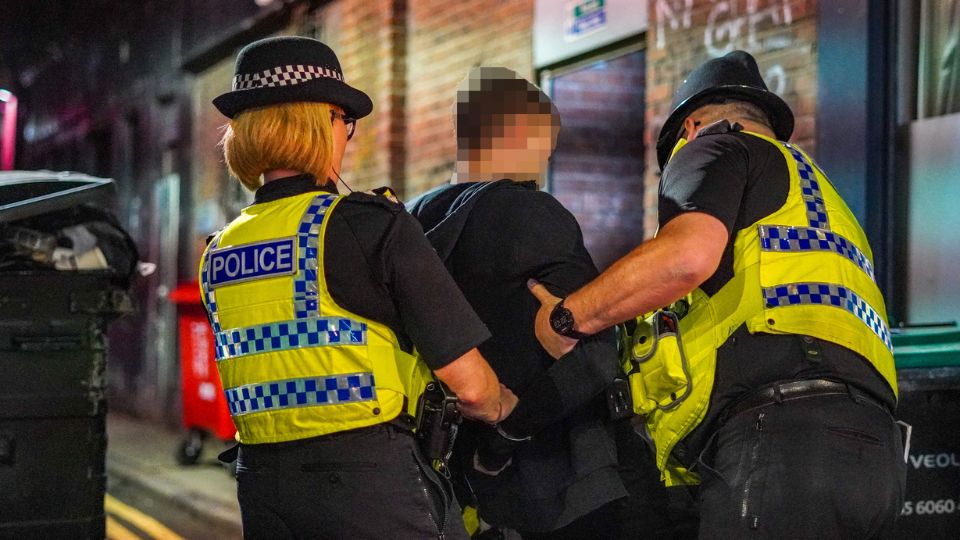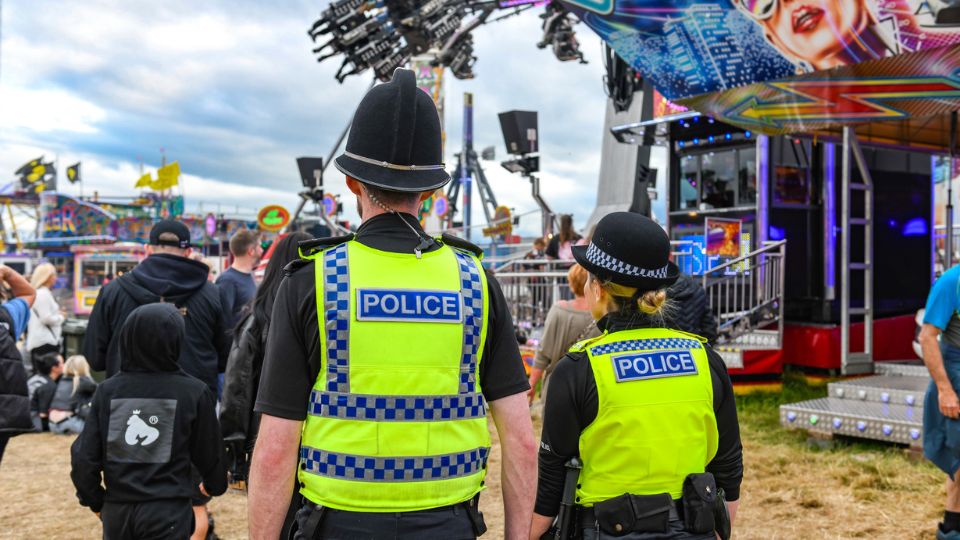POLICE OFFICER ELIGIBILITY
Whilst we welcome applications from people of all backgrounds, there are some police officer eligibility conditions that all applicants need to meet. Before starting your application, please ensure you meet our police officer eligibility and entry route requirements.
Are you eligible?
To join as a police officer or detective at Northumbria Police applications must choose an entry route based on their eligibility and desired career path.
Applicants for the Police Constable Degree Apprenticeship must have:
- Level 2 qualifications in both English and Maths for example a GCSE or iGCSE at grade C (level 4) or above, Functional Skills Level 2, Key Skills Level 2 (Communication and / or Literacy) or Adult Numeracy / Literacy Plus
AND
- Level 3 qualifications where the grades total 112 UCAS points or higher. Your Tariff Points can be made up of a number of different types of qualifications. Please utilise the UCAS calculation tool to help you. Please utilise the UCAS calculation tool to help you.
OR
- Be aged 21+ and have a minimum of 2 Level 3 (or higher) qualifications. PLUS a minimum of 3 years work experience that will support your progression into the role. We will review work experience in line with our core force values and the National Police Officers competency and values framework.
When completing your application, it’s important that you attach proof of your qualifications. Your application will not be accepted without a copy of your certificates unless you are within your final year of study.
If you have specific questions about the entry requirements, or your qualifications/experience please get in touch with our Talent Acquisition team.
To join as a police officer or detective at Northumbria Police applications must choose an entry route based on their eligibility and desired career path.
Applicants for the Degree Holder Entry Programme and Graduate Detective Programme must:
- Hold a level 6 degree or higher (i.e. master’s degree/ PhD, etc.) in any subject area or be a student within the final year of study for a degree.
AND
- Hold level 2 qualifications in both English and Maths. For example a GCSE or iGCSE at grade C (level 4) or above, Functional Skills Level 2, Key Skills Level 2 (Communication and / or Literacy) or Adult Numeracy / Literacy Plus
When completing your application, it’s important that you attach proof of your qualifications. Your application will not be accepted without a copy of your certificates unless you are within your final year of study.
If you have specific questions about the entry requirements, or your qualifications/experience please get in touch with our Talent Acquisition team.
To join as a police officer or detective at Northumbria Police applications must choose an entry route based on their eligibility and desired career path.
Applicants for the Police Constable Entry Programme must have:
- Level 2 qualifications in both English and Maths for example a GCSE or iGCSE at grade C (level 4) or above, Functional Skills Level 2, Key Skills Level 2 (Communication and / or Literacy) or Adult Numeracy / Literacy Plus
AND
- Hold two Level 3 (or higher) qualifications.
OR
- Hold a degree in Professional Policing Practice from a College of Policing accredited supplier or be in your final year of study. If you have a Professional Policing Degree you will automatically be enrolled onto our PCEP entry route.
OR
- If you don’t have A-Levels but do have at least one year of professional experience working in areas such as those below, we encourage you to apply: (note that this is not an exhaustive list and all previous experience will be assessed on a case-by-case basis.) armed forces, border force, criminal justice sector/CPS/courts, cyber/digital and financial fraud crimes, emergency services, health and social care sectors, justice and law enforcement sectors, police staff (particularly custody, public contact/demand hub/enquiry office roles and investigative roles), PCSO or Special Constable, prison service, professional services/project management, teaching, youth work.
When completing your application, it’s important that you attach proof of your qualifications. Your application will not be accepted without a copy of your certificates unless you are within your final year of study.
If you have specific questions about the entry requirements, or your qualifications/experience please get in touch with our Talent Acquisition team.
Our health and fitness standards aren’t as demanding as many assume, but you’ll need to handle the physical and emotional challenges of the role. These include dealing with volatile or traumatic situations and working long shifts.
During recruitment, we conduct a thorough health screening and medical assessment. If you have previous or ongoing health conditions that pose a risk in the role, your application may not succeed. We offer support to our officers, but recruitment standards exist to protect you, your colleagues, and the public—and to ensure long-term success in the role.
We can’t assess your medical history before making a conditional offer. Please read the Home Office Medical Standards and Annexes A & B to check whether your medical history or current conditions could affect your eligibility. These documents reflect the latest medical advice on fitness for police work. We review each application individually, but you may not be eligible if you’re receiving mental health treatment, recovering from a major operation, or have recently experienced an epileptic seizure.
As part of the medical checks, you must pass a BMI analysis. The recruitment standard range is 18–30. Everyone’s journey to fitness looks different, but with determination, practice, and support, you can reach the required level.
You must meet a national police eyesight standard. You are permitted to wear contact lenses or spectacles to do so.
Misusing substances goes against everything the police stands for. If you currently use illegal drugs, you won’t be eligible to apply.
During the recruitment medical process, we test for substance misuse. We may also carry out substance misuse testing at any point during your career with us.
The fitness test measures your endurance to confirm you can handle the physical demands of operational policing.
You’ll complete a 15-metre shuttle run, timed to a bleep. As the test continues, the bleeps come closer together, so you’ll need to run faster. To pass, you must reach level 5.4, which takes about 3 minutes and 40 seconds.
If you’re unsure about reaching this level, start improving your fitness now. Always check with your doctor before making major changes to your exercise routine.
Police officers and staff hold privileged access to sensitive information and must be protected from potential corruption. While many people have debts like mortgages or student loans, applicants should not be under pressure from unmanaged or undischarged debts.
You’re unlikely to pass vetting if you have:
- An outstanding County Court Judgment (CCJ).
- If you’ve been declared bankrupt, clearance is typically not granted until three years after discharge. Debt Relief Orders (DROs) are treated similarly.
- If you’re under an Individual Voluntary Arrangement (IVA), you’ll need to provide documentation and proof of consistent payments over several months.
We recommend running a free credit report before applying to identify any defaulted accounts or CCJs that may affect your vetting outcome.
Cautions or convictions will not necessarily preclude you from joining Northumbria Police. It will depend on the nature and the circumstances of the offence. However, an applicants honesty and integrity will be brought into question if information is considered to have been purposely withheld during the vetting process.
Each case will be considered on its individual merits.
Circumstances that will prevent you from passing our vetting process include:
- offences were committed as an adult or juvenile which resulted in a prison sentence (including custodial, suspended or deferred sentence and sentences served at a young offenders’ institution or community home).
- the applicant is or has been a registered sex offender or is subject to a registration requirement in respect of any other conviction.
The following circumstances may also result in rejection:
- offences where vulnerable people were targeted.
- offences motivated by hate or discrimination.
- offences of domestic abuse.
You must be at least 17 years old to apply. However, you cannot start employment until you turn 18 and have met the required qualifications.
There is no upper age limit for applying. Please note that the normal retirement age for police officers is 60, and all new recruits must complete a three-year probationary period.
You must have been continuously resident in the UK for the three years immediately prior to applying. This ensures all applicants can be vetted fairly.
If you’ve spent time overseas on a gap year or similar, this is generally considered an extended holiday (typically under 12 months), and you are still regarded as having maintained UK residency.
You must look smart and clean at all times while representing the Force on duty. You can wear religious or cultural clothing, as long as it’s suitable for the role.
- Headwear – If you wear a turban or an Imama Shareef, make sure the force badge is clearly visible. If you wear a hijab or skullcap, you must wear your official headwear over it while on foot patrol.
- Facial hair – Operational officers should keep beards short to avoid health and safety risks. We may allow exceptions for religious reasons.
- Jewellery – We assess religious jewellery on a case-by-case basis. You may wear it if it doesn’t pose a significant health and safety risk and remains unobtrusive.
We have a policy to prevent officers and staff from becoming members of organisations or groups whose aims, objectives or pronouncements may contradict our duty to promote equality (e.g. BNP, Combat 18, National Front etc.). Therefore, if you are a member of a proscribed organisation or other group, you will not be accepted.
- undermine the dignity and authority of the office of constable;
- cause offence to members of the public or colleagues and/or invite provocation
- indicate unacceptable attitudes towards any individual or section of the community
- indicate alignment with a particular group which could give offence to members of the public or colleagues; and
- be considered inflammatory, rude, lewd, crude, racist, sexist, sectarian, homophobic, violent or intimidating
Although tattoos will not prohibit applicants from joining Northumbria Police (subject to the above), it is recommended they are covered when at work to maintain a professional image. The dress and appearance protocol outlines that officers should wear appropriate work wear which covers tattoos as far as possible when at work, which will be issued accordingly.
If your tattoo is determined as not acceptable, your application will not be progressed.
You must declare any other employment or business interests you intend to maintain. This ensures they do not conflict with police duties, undermine public confidence, or affect the reputation of Northumbria Police or its officers.
Police officers and certain police staff roles are also restricted from engaging in political activity. This includes standing as a Member of Parliament or local councillor, or holding office in a political party.
You must have a full UK manual driving licence or such overseas license as is recognised by the UK licensing authorities as permitting the holder to drive manual cars in the UK. But, we do accommodate for applicants who don’t drive due to a disability.
To be eligible for appointment, you must be a British citizen or resident in the UK free of restrictions (e.g. under the EU Settlement scheme or through the UK’s post-Brexit points-based immigration rules).
If you are not a British citizen, you must provide proof during the recruitment process that you have no restrictions on your stay in the UK and that you have the right to work in the UK. Information on UK immigration rules can be found on the government visa and immigration website.
If you have a family member, friend or associate with criminal convictions – or if you know they’re involved in criminal activity – you must declare this in your application.
Explain your relationship with the individual, how often you see them, the nature of your connection, and what steps you’ve taken to distance yourself from their criminal behaviour. Share as much detail as you can based on what you know.
Such an association doesn’t automatically disqualify you from vetting clearance.
The College of Policing advises us to review publicly available social media accounts for inappropriate comments, behaviour, or views. This ensures applicants’ online conduct aligns with the Code of Ethics and Standards of Professional Behaviour.
We therefore carry out social media checks on all applicants, including platforms such as Facebook, Instagram, X (formerly Twitter), TikTok, YouTube, and others.
Failing to declare relevant information during the vetting process can raise concerns about your honesty and integrity, which may lead to a refusal of clearance.
Some applicants say a police officer told them an incident wouldn’t be recorded. You should assume that everything is recorded, and failing to disclose it could harm your application.
If you declare something irrelevant, the Force Vetting Unit will disregard it.
Frequently asked questions about our vetting process
To avoid common vetting mistakes and ensure your application is processed smoothly:
- Read carefully: Take your time to review each question and any guidance provided.
- Be honest: If you’re unsure whether to include something, declare it. The vetting unit will disregard anything not required.
- Explain gaps: If you can’t recall specific details, provide a clear rationale.
- Include full address history: Don’t forget student accommodation or temporary residences.
- List all family members: Include half-siblings, stepfamily, and full details of your partner or spouse.
- Clarify relationships: Only include partners you live with or are married to/civil partnered with under the spouse/partner section.
- Provide complete details: Include maiden names, dates of birth, and addresses for everyone listed.
- Declare all police interactions: This includes convictions, cautions, and motoring offences. Omitting details may raise concerns about your integrity.
- Know your disclosure obligations: Police staff and volunteers don’t need to declare protected cautions or convictions under the Rehabilitation of Offenders Act 1974 (Exceptions) Order 1975.
- Mention criminal associates: Include friends, family, or housemates with known criminal involvement.
You must inform the Force Vetting Unit of any changes to your personal circumstances during and after the vetting process. It is your responsibility to report these changes.
Please notify the Force Vetting Unit if any of the following apply:
- You change your name or address
- Someone over the age of 10 moves in or out of your residence
- You change your partner
- Your financial status changes significantly (e.g. receiving a windfall over £9,000, defaulting on an account, receiving a county court judgment, or entering a debt management plan)
- You become involved in any criminal legal proceedings (including convictions, cautions, and motoring offences such as speeding fines)
- A civil matter results in an adverse finding (e.g. child contact restrictions, non-molestation orders, bankruptcy orders)
- Anyone listed on your original vetting or application forms receives a conviction, caution, or becomes involved in a criminal investigation
Applicants may be refused for many reasons, and wherever possible, we will explain those reasons. However, in some cases, we cannot disclose the details because the information may involve a family member, a criminal associate, or fall under an exemption in the Data Protection Act.
Yes. You may appeal a vetting decision where you believe one or more of the following factors apply:
- Further information is available that was not considered by the decision maker.
- The vetting rejection was disproportionate considering the circumstances or details of the case.
- The decision was perverse or unreasonable.
- No explanation was given for the decision.
Any appeal must be in writing and must clearly set out the grounds for appeal. Appeals are dealt with by a senior officer or member of staff who is independent of the original decision-making process and has not been previously involved in the case. Applicants should address their appeal to the Force Vetting Unit in the first instance who will pass the appeal, along with any rationale for the decision, to a senior officer or member of staff who will look into the case and respond directly to the applicant.
Each case is treated on its merits and therefore it depends on what information is found during the checks. Sometimes it is necessary to call the applicant to interview so that their personal circumstances may be discussed and sometimes it is necessary to make enquiries in other forces or with other bodies. Therefore, we do not give a set time to complete a vetting file but deal with them as quickly as possible.
Ways into policing
From high-adrenaline and fast-paced work, to analytical and problem-solving positions, there’s a role that’s right for you.
Discover your path with a degree apprenticeship, graduate programme, or experience-led entry routes. Your journey into policing starts here.
999 response officer
An on-the-go, ‘no two days the same’ job, where you’ll respond to incidents that need your help.
Neighbourhood officer
Neighbourhood officers are problem-solvers, change-makers, and protectors at the
heart of a community.
Detective
Our detectives thrive on the pursuit of justice, meticulously leading complex investigations to achieve the best outcomes for victims.
Take your first steps into policing
Before you apply to become a 999 response officer, detective or neighbourhood officer you’ll need to join a mandatory information event.
Here, you’ll gain insight into what working at Northumbria Police is really like, find out more about the application process and how to prepare for the role, eligibility requirements, police officer pay & benefits, and you’ll have the opportunity to speak to current officers.
We’ll also guide you through the different entry routes available, including the degree apprenticeship, graduate programme, and experience-led pathways — so you can choose the route that’s right for you.
Choose your preferred date below to sign up for an upcoming online Teams event.
Can’t make these sessions? We’ll be running events all year, check back for later dates.



